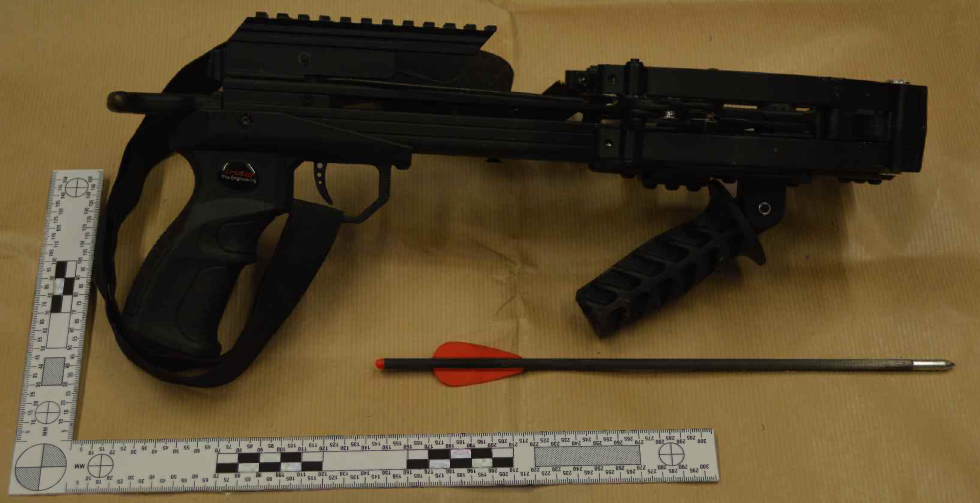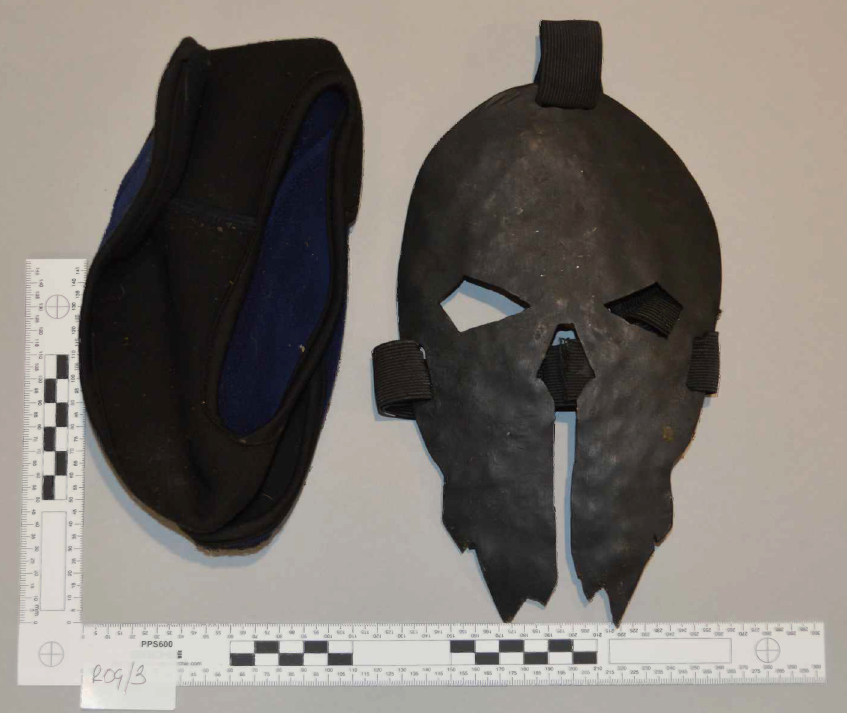Man admits treason after taking crossbow to Windsor Castle and threatening to kill Queen
‘Morning, can I help mate?’ police officer asked masked man as he approached Queen’s living quarters
A man has admitted treason after taking a loaded crossbow to Windsor Castle and threatening to kill the Queen while dressed “like something out of a vigilante movie”.
Jaswant Singh Chail was caught in the private grounds of the royal residence on Christmas Day in 2021 and “informed officers at the scene that he intended to kill the Queen”, prosecutors said.
He appeared at London’s Old Bailey by video-link from Broadmoor Hospital on Friday, having been detained under the 1983 Mental Health Act.
Chail, 21, pleaded guilty to making a threat to kill the late monarch and travelling to Windsor Castle with an offensive weapon.
He admitted a rare charge under the 1842 Treason Act which states: “Near to the person of the Queen, you did wilfully produce or have a loaded crossbow with intent to use the same to injure the person of Her Majesty Queen Elizabeth II, or to alarm Her Majesty.”
A case summary produced by the Crown Prosecution Service (CPS) said that the Queen was at Windsor Castle, along with other members of the royal family who had gathered to celebrate Christmas when Chail was caught.
A protection officer from the Royalty and Specialist Protection Command was on duty shortly after 8am on 25 December 2021 when he noticed Chail “walking slowly through the private grounds towards him”.
When the officer approached, he saw that Chail was wearing a hood, gloves and a mask that looked “like something out of a vigilante movie or [like he was] dressed for Halloween”.
Prosecutors said the officer unclipped his Taser and asked Chail: “Morning, can I help mate?” The defendant replied “I am here to kill the Queen”, and the police officer saw his crossbow.
“The officer drew his Taser and shouted for the defendant to drop the bow and get to his knees,” the case summary said.
“The defendant immediately complied and after being told to do so placed his hands on the top of his head before repeating ‘I am here to kill the Queen’.”
A handwritten note found in Chail’s pocket read: “Please don’t remove my clothes, shoes and gloves, masks etc, don’t want post-mortem, don’t want embalming, thank you and I’m sorry.”
At the time of his arrest, Chail had loaded the crossbow and taken the safety catch off, and he had reached a secure area close to the entrance to the late monarch’s private residence.

He had also threatened to kill the Queen in a video that he sent to friends 10 minutes before his arrest.
Footage showed Chail, wearing a mask and hood, holding the crossbow and saying in a distorted voice: “I’m sorry. I’m sorry for what I’ve done and what I will do. I will attempt to assassinate Elizabeth, Queen of the Royal Family.”
Chail said her death would be revenge for “those who have been killed, humiliated and discriminated on because of their race”.
He spoke of the Jallianwala Bagh massacre in India in 1919, when British colonial troops opened fire on peaceful pro-independence protesters, killing hundreds of people.
The Metropolitan Police said that evidence uncovered in the investigation indicated that Chail “harboured ill-feeling towards the British empire for its past treatment of Indian people”.
Commander Richard Smith, who leads the force’s Counter Terrorism Command, said: “This was an extremely serious incident, but one which the patrolling officers who apprehended Chail managed with great composure and professionalism.
”They showed tremendous bravery to confront a masked man who was armed with a loaded crossbow, and then detain him without anyone coming to harm.
“Our Royalty and Specialist Protection Command works with the royal household and local police forces at various royal residences across the country to ensure those living, working or visiting are kept safe.”

Chail, who was aged 19 at the time, is unemployed but previously worked at a Co-op supermarket, while living with his parents and sister in Hampshire.
Justice Jeremy Baker said Chail would be sentenced on 31 March, after the court is sent a psychiatric report assessing his culpability.
Nick Price, head of the CPS Special Crime and Counter Terrorism Division, said: “Thankfully police officers intervened and nobody was hurt.
“This was a serious incident, but fortunately a rare one. We are grateful to all those who were involved in the investigation.”
The 1842 Treason Act made it an offence to assault the sovereign or use a weapon to cause them alarm after a man aimed a pistol at Queen Victoria during a carriage ride.
John Francis was convicted of high treason but escaped the death penalty and days later, another man called John Bean, fired a pistol at Queen Victoria loaded only with paper and tobacco.
The CPS said that Prince Albert encouraged parliament to pass a law recognising lesser crimes against the monarch, such as intent to alarm, which would not attract the death penalty merely because they were labelled as “high treason”.
The last conviction under the law came in 1981 was Marcus Sarjeant, who was jailed for five years for firing blank shots at Queen Elizabeth II when she was on parade.
A separate and more serious law, the 1351 Treason Act, was most recently used for William Joyce, known as Lord Haw-Haw, who collaborated with Germany during the Second World War.




